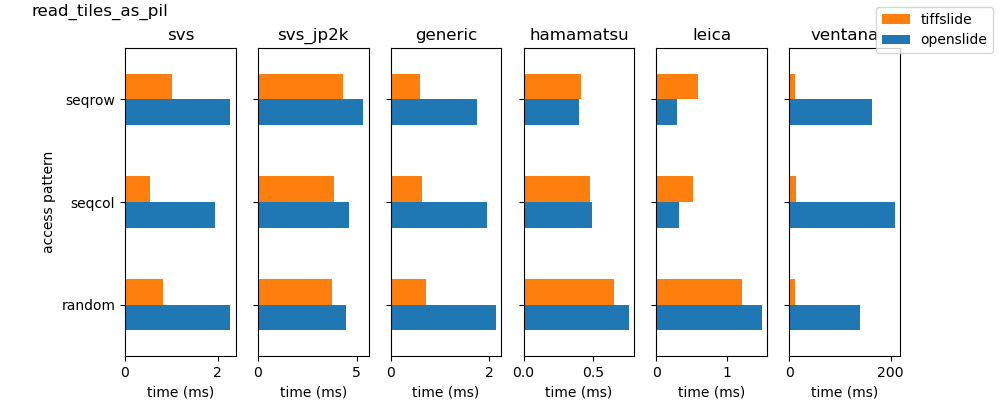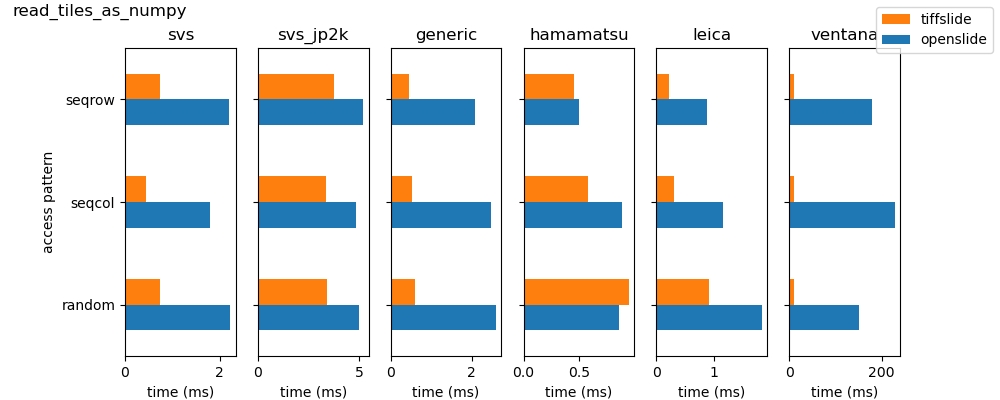tiffslide: a drop-in replacement for openslide-python
Welcome to tiffslide 👋, a tifffile based
drop-in replacement for openslide-python.
tiffslide's goal is to provide an easy way to migrate existing code from an
openslide dependency to the excellently maintained tifffile module.
We strive to make your lives as easy as possible: If using tiffslide is
unintuitive, slow, or if it's drop-in behavior differs from what you expect,
it's a bug in tiffslide. Feel free to report any issues or feature requests in
the issue tracker!
Development happens on github ![]()
Notes
TiffSlide aims to be compatible with all formats that openslide supports and more,
but not all are implemented yet. Aperio SVS is currently the most tested format.
Contributions to expand to a larger variety of file formats that tifffile supports are very welcome
If there are any questions open an issue, and we'll do our best to help!
Compatibility
Here's a list with currently supported formats.
| File Format | can be opened | full support | references |
|---|---|---|---|
| Aperio SVS | ✅ | ✅ | |
| Generic TIFF | ✅ | ||
| Hamamatsu NDPI | #35 | ||
| Leica SCN | ✅ | ||
| Ventana | #37 | ||
| Hamamatsu VMS | 🚫 | ||
| DICOM | 🚫 | #32 | |
| Mirax | 🚫 | 🚫 | #33 |
| Zeiss ZVI | 🚫 |
Documentation
Installation
tiffslide's stable releases can be installed via pip:
pip install tiffslideOr via conda:
conda install -c conda-forge tiffslideUsage
tiffslide's behavior aims to be identical to openslide-python where it makes sense. If you rely heavily on the internals of openslide, this is not the package you are looking for. In case we add more features, we will add documentation here.
as a drop-in replacement
# directly
from tiffslide import TiffSlide
slide = TiffSlide('path/to/my/file.svs')
# or via its drop-in behavior
import tiffslide as openslide
slide = openslide.OpenSlide('path/to/my/file.svs')access files in the cloud
A nice side effect of using tiffslide is that your code will also work with filesystem_spec, which enables you to access your whole slide images from various supported filesystems:
import fsspec
from tiffslide import TiffSlide
# read from any io buffer
with fsspec.open("s3://my-bucket/file.svs") as f:
slide = TiffSlide(f)
thumb = slide.get_thumbnail((200, 200))
# read from fsspec urlpaths directly, using your AWS_PROFILE 'aws'
slide = TiffSlide("s3://my-bucket/file.svs", storage_options={'profile': 'aws'})
thumb = slide.get_thumbnail((200, 200))
# read via fsspec from google cloud and use fsspec's caching mechanism to cache locally
slide = TiffSlide("simplecache::gcs://my-bucket/file.svs", storage_options={'project': 'my-project'})
region = slide.read_region((300, 400), 0, (512, 512))read numpy arrays instead of PIL images
Very often you'd actually want your region returned as a numpy array instead getting a PIL Image and then having to convert to numpy:
import numpy as np
from tiffslide import TiffSlide
slide = TiffSlide("myfile.svs")
arr = slide.read_region((100, 200), 0, (256, 256), as_array=True)
assert isinstance(arr, np.ndarray)Development Installation
If you want to help improve tiffslide, you can setup your development environment in two different ways:
With conda:
- Clone tiffslide
git clone https://github.com/bayer-science-for-a-better-life/tiffslide.git cd tiffslideconda env create -f environment.devenv.yml- Activate the environment
conda activate tiffslide
Without conda:
- Clone tiffslide
git clone https://github.com/bayer-science-for-a-better-life/tiffslide.git cd tiffslidepython -m venv venv && source venv/bin/activate && python -m pip install -U pippip install -e .[dev]
Note that in these environments tiffslide is already installed in development
mode, so go ahead and hack.
Benchmarks
Here are some benchmarks comparing tiffslide to openslide for different
supported file types and access patterns. Please note that you should test the
difference in access time always for yourself on your target machine and your
specific use case.
In case you would like a specific use case to be added, please feel free to open an issue or make a pull request.
The plots below were generated on a Mac Laptop and the files were stored on the internal ssd. The benchmarks can be generated by running:
OPENSLIDE_TESTDATA_DIR=/path/to/testdata/ python docs/generate_benchmark_plots.py
Note, that in general, on my test my machine, tiffslide outperforms openslide
when reading data as numpy arrays. Ventana tile reading is not "correct"
since as of now (1.5.0) tiffslide lacks compositing for the overlapping tiles.
reading PIL images
reading Numpy arrays
Contributing Guidelines
- Please follow pep-8 conventions but:
- We allow 120 character long lines (try anyway to keep them short)
- Please use numpy docstrings.
- When contributing code, please try to use Pull Requests.
- tests go hand in hand with modules on
testspackages at the same level. We usepytest.
You can setup your IDE to help you adhering to these guidelines.
(Santi is happy to help you setting up pycharm in 5 minutes)
Acknowledgements
Build with love by Andreas Poehlmann and Santi Villalba from the Machine Learning Research group at Bayer.
tiffslide: copyright 2020 Bayer AG, licensed under BSD






